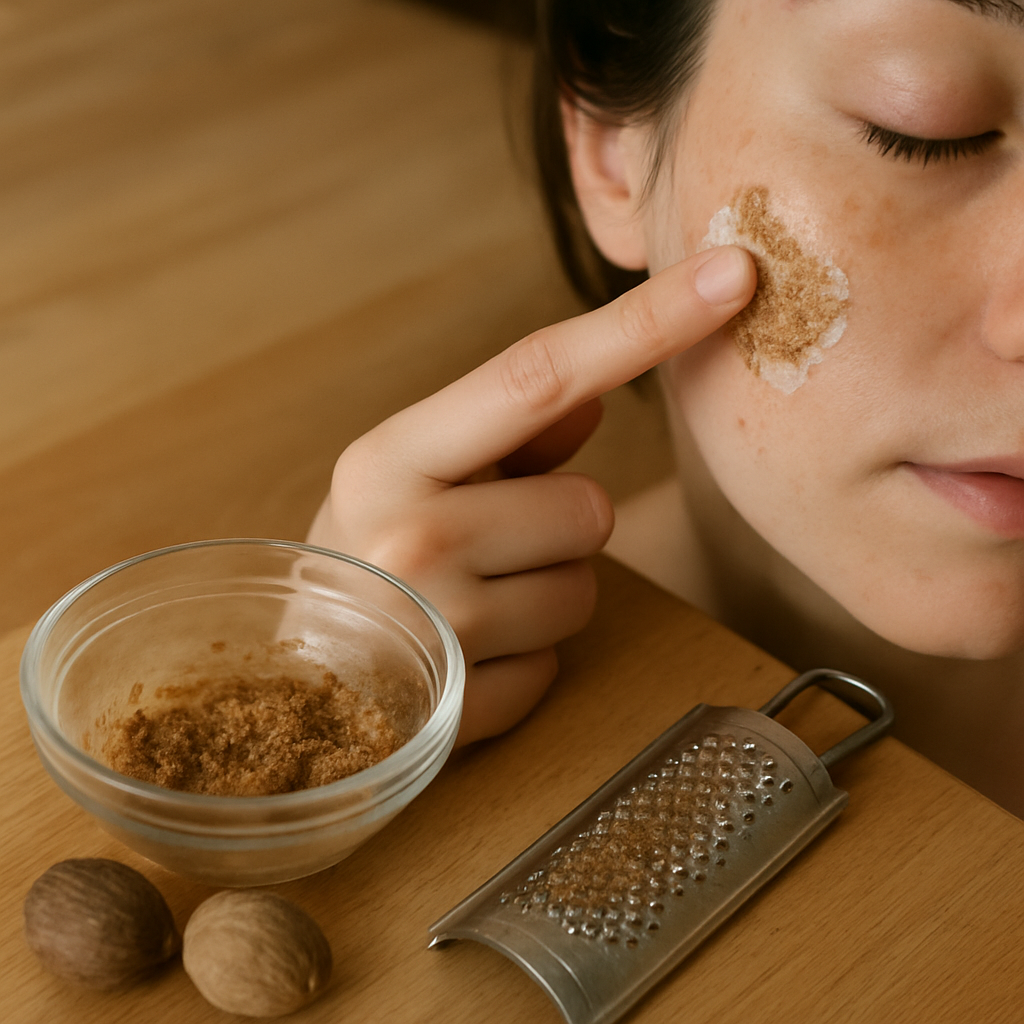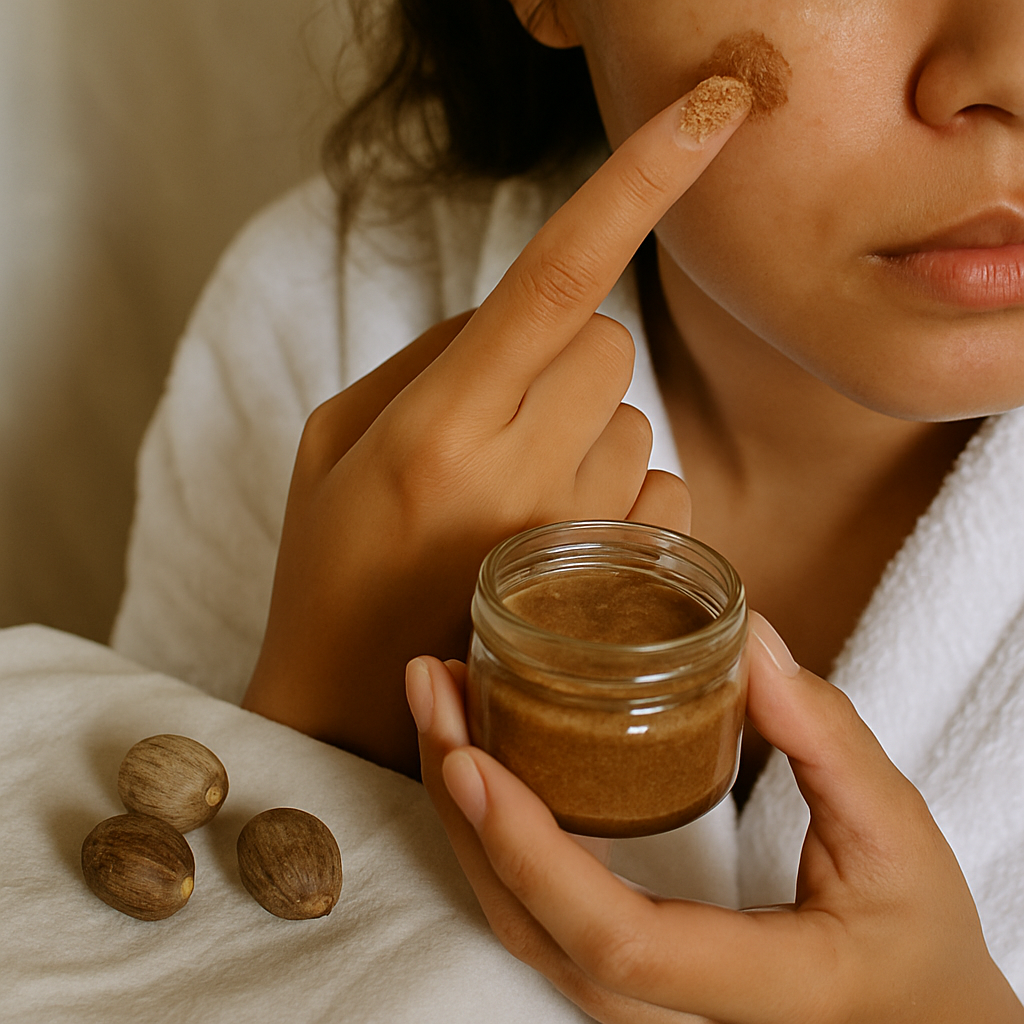Ask Ayurvedic doctor a question and get a consultation online on the problem of your concern in a free or paid mode. More than 2,000 experienced doctors work and wait for your questions on our site and help users to solve their health problems every day.
How to Use Nutmeg for Skin Pigmentation: Ayurvedic Remedies

If you've been battling uneven skin tone, stubborn dark spots, or pigmentation patches that just won’t fade — you’re not alone. Many of us are constantly looking for natural, affordable solutions that actually work. That’s where nutmeg comes in. This humble kitchen spice isn’t just for holiday baking — it’s a secret weapon for radiant, even-toned skin.
Whether you're curious about how to use nutmeg for skin pigmentation, wondering if nutmeg is good for skin, or looking to whip up a DIY treatment, this guide will walk you through the Ayurvedic approach to clearer skin. We’ll cover nutmeg powder for skin, how to use it overnight, and why it's considered such a powerhouse in traditional beauty remedies. But first, let’s understand what really causes skin pigmentation and how nutmeg fits in.

How to Use Nutmeg for Skin Pigmentation
You’ve learned that nutmeg’s packed with skin-loving properties — now let’s get our hands dirty (well, a little spicy) and explore how to use nutmeg for skin pigmentation in practical, safe, and super effective ways.
DIY Nutmeg Face Masks and Spot Treatments
The simplest way to use nutmeg powder for skin pigmentation is by making a paste. You don’t need fancy ingredients. Honestly, just three things from your kitchen will do the trick.
Basic Nutmeg Spot Treatment:
-
½ teaspoon nutmeg powder
-
A few drops of raw honey (or milk if your skin leans oily)
-
Mix into a paste and dab it right on dark spots
-
Leave for 15–20 minutes, rinse with lukewarm water
If you’re dealing with acne marks plus pigmentation, you can even add a pinch of cinnamon. But warning — cinnamon is strong, so do a test run unless you wanna feel like your face is on fire (ouch).
Nutmeg + Yogurt Face Mask (for brightening):
-
1 teaspoon nutmeg powder
-
1 tablespoon plain yogurt
-
Optional: 1/4 teaspoon turmeric
-
Apply evenly, let sit for 15 mins, rinse gently
The lactic acid in yogurt helps with exfoliation while nutmeg works on fading pigmentation. This combo legit gives you that "just had a facial" glow. One of those rare times when kitchen DIYs actually deliver.
How to Use Nutmeg for Skin Pigmentation Overnight
Okay, this is where things get interesting. People often ask how to use nutmeg for skin pigmentation overnight, and yes — you can leave it on, but you’ve gotta do it safely.
Overnight Spot Cream Idea:
-
½ teaspoon nutmeg
-
1 teaspoon aloe vera gel
-
Mix well, dab a thin layer on dark spots (not your whole face)
-
Wash off gently in the morning
Why aloe? It calms any irritation and makes it safe for extended wear. Just don't go overboard. Using too much nutmeg can dry out or irritate skin — especially if it’s sensitive or dry to begin with.
Also, pls don’t sleep with a thick spice paste on your pillow. Trust me, waking up with nutmeg on your sheets ain't cute.
How Often to Apply Nutmeg on Skin
Start slow. Like, really slow. Twice a week is plenty in the beginning. Once your skin gets used to it, you can go up to three times a week — max. Overusing it can cause redness or dryness, and that kinda defeats the purpose, doesn’t it?
Also, always moisturize after. Nutmeg may be magical, but your skin still needs hydration to heal and glow.
Patch Test, Skin Sensitivity, and Contraindications
Before you slather nutmeg on your face, do a patch test — ideally on the inside of your arm. Wait 24 hours. No redness or itching? Cool, you're good to go.
If you have conditions like rosacea, eczema, or active breakouts — proceed with caution. Nutmeg can sting on broken skin. And never mix it with strong acids (like vitamin C or retinols) unless you like living on the edge.
Is Nutmeg Safe for All Skin Types?
Mostly yes — but with a few exceptions. Oily and combination skin usually loves nutmeg. Dry skin folks might need to mix it with more soothing ingredients (like milk or aloe). Sensitive skin types should patch test every time they try a new combo.
And if you’re unsure? Check with a dermatologist before making nutmeg your go-to skincare BFF.

Don't wait or self medicate. Start chat with Doctor NOW
What Causes Skin Pigmentation and Dark Spots
Skin pigmentation is your body’s way of reacting to internal imbalances or external stressors. It's usually harmless — but it can be super frustrating when it shows up right on your face.
Common Triggers: Sun, Inflammation, Hormones
The most common cause of pigmentation is sun exposure. UV rays stimulate melanin production, which can lead to freckles, sun spots, and uneven patches. Then there’s post-inflammatory hyperpigmentation (PIH) — those pesky marks that show up after pimples, cuts, or other skin injuries.
Hormonal fluctuations (hello, melasma), certain medications, or even stress can mess with your melanin levels too. That’s why it’s not always easy to pinpoint just one cause. And that’s where Ayurveda takes a more holistic look.
Ayurvedic View: Pitta Imbalance and Skin Health
In Ayurveda, skin issues like pigmentation are often linked to a Pitta dosha imbalance — meaning excess heat and inflammation in the body. When Pitta is aggravated, it can manifest as red patches, acne scars, or dark spots on the skin. The solution? Cooling, grounding herbs and spices. And yes, that includes nutmeg.
Nutmeg (known as jaiphal in Ayurveda) has been used for centuries for its calming, warming — yet balancing — effects. But is nutmeg good for skin pigmentation? Let’s break it down.

Is Nutmeg Good for Skin Pigmentation?
Nutmeg Properties in Ayurveda
Nutmeg is considered tridoshic in Ayurveda, meaning it balances all three doshas (Vata, Pitta, and Kapha). It has anti-inflammatory, antibacterial, and antioxidant properties, making it a strong candidate for treating acne scars, blemishes, and pigmentation issues.
It also has a mild exfoliating effect — so it helps slough off dead skin cells while boosting circulation to the skin’s surface. A bit of a multitasker, huh?
Nutmeg Powder for Skin: Why It Works for Dark Spots
So what makes nutmeg powder for skin so effective, especially when it comes to pigmentation? The active compounds in nutmeg — like myristicin, elemicin, and safrole — help lighten dark spots by gently exfoliating and encouraging cell turnover.
Combine it with honey or milk, and you’ve got a nourishing, spot-fading treatment right from your kitchen. But, here’s the catch — you have to use it properly. A little goes a long way, and using it too often can irritate sensitive skin (been there, done that).
Conclusion
So, is nutmeg just another overhyped kitchen remedy? Or is it a legit solution for skin pigmentation?
Turns out — it’s both powerful and practical. From reducing dark spots to brightening overall skin tone, the benefits of nutmeg on skin are hard to ignore. Used correctly, nutmeg powder for skin pigmentation can act as a natural exfoliant, fade stubborn marks, and give you that glow-from-within look we all lowkey want.
But — and here’s the kicker — consistency matters. Don’t expect overnight miracles. Natural remedies take time to work, and your skin needs patience, not punishment. If you're serious about getting results, commit to a routine. Keep it simple, keep it regular.
Also, don’t forget the basics: stay hydrated, wear sunscreen (seriously, even indoors), and listen to your skin. If something feels off — stop. Beauty should never come at the cost of your comfort.
So next time you see a jar of nutmeg sitting in your kitchen, maybe give it a second look. Who knew that same spice you toss in your chai could actually help you get clearer skin?
If you found this helpful, share it with a friend who’s been looking for a natural skincare fix — or just tag them and say “You gotta try this!”
FAQs
How long does it take for nutmeg to reduce dark spots?
It varies based on your skin type and the severity of the pigmentation. Generally, with regular use (2–3 times a week), you might start noticing changes within 3–4 weeks. That said, nutmeg benefits for skin pigmentation build up over time — so be patient and don’t rush it. You won't see miracles in 2 days, let's be real.
Can I use nutmeg powder on my face every day?
Nope, not a great idea. Nutmeg is potent and can be irritating if overused. Stick to using it 2–3 times per week, max. Daily application might dry out your skin or cause redness, especially if you're already using active skincare ingredients. Less is more in this case.
What should I mix with nutmeg for better results?
Depends on your skin type. Here are some ideas:
-
Honey: for hydration and antibacterial benefits
-
Yogurt: gentle exfoliation and brightening
-
Aloe vera: soothes irritation and great for overnight use
-
Milk: for dry skin and deeper nourishment
Each combo supports the nutmeg uses for skin in different ways — so feel free to experiment (but again, patch test first!!)
Final Thoughts
In a world overflowing with chemical creams and overpriced serums, sometimes the best remedies are the ones sitting quietly in your pantry. Whether you're going full-on Ayurvedic or just trying out a new skincare hack, nutmeg for skin pigmentation might just be the underdog your routine needs.
Start slow, be consistent, and embrace the process. Your skin deserves it.
And hey — don’t gatekeep this! If this helped you, share the glow. ✨

